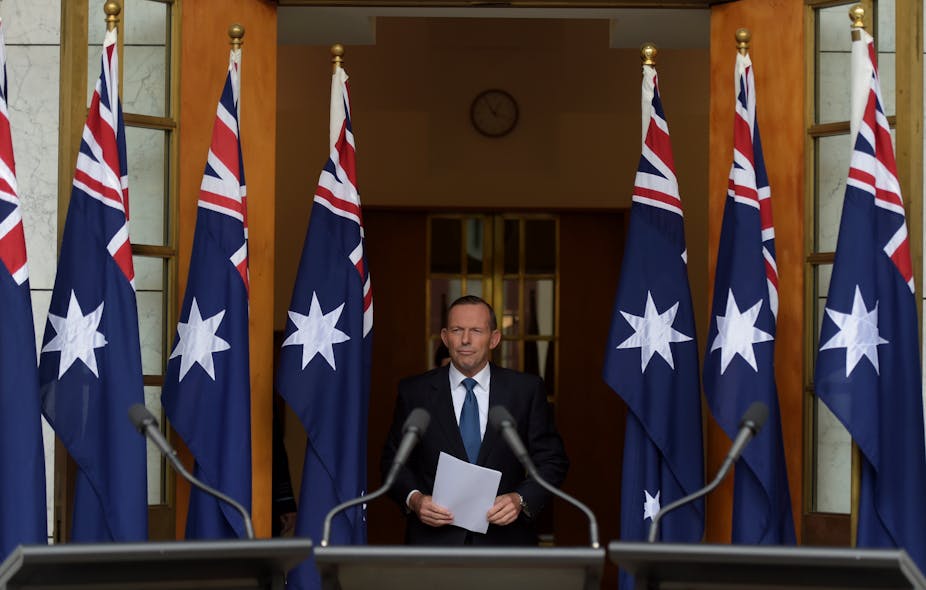Prime Minister Tony Abbott has confirmed Australia will send about 300 more troops to Iraq to help train Iraqi security forces as a contribution to the international Building Partner Capacity mission.
Abbott said this marked “the next phase” of Australia’s contribution to disrupt, degrade and ultimately defeat Islamic State (IS). He denied the deployment was “mission creep” but declined to guarantee it would be the last escalation of Australia’s commitment.
The campaign was one that Australia was engaged in with its Middle Eastern friends and traditional allies, “and it would be wrong of me to say that this is the last that we will do here”, Abbott said.
With the government stepping up its emphasis on security on several fronts, Abbott directly linked the new commitment to domestic safety, referring to the Martin Place siege and the attack on police in Victoria, which were “inspired by the death cult” of IS. Last week he announced new measures on security and this week the legislation for the compulsory retention of metadata is before parliament.
“The security of Australia today isn’t to be obtained simply here in this country … Domestic security requires a very strong element of international security,” Abbott said.
The commitment, with the precise number of troops still to be finalised, will include command force protection and support elements, and will work closely with a New Zealand force announced last week.
Iraq and the United States had requested the Australian commitment, Abbott told a news conference, at which he was flanked by the chief of Australian Defence Force, Air Chief Marshal Mark Binskin, and Defence Minister Kevin Andrews.
The troops will be based at Taji, northwest of Baghdad, and the mission is expected to start in May. The troops will not be engaged in combat - they will be, in military terms, “behind the wire” in a training role.
Australia already has an air task group flying strike and refuelling missions, as well as about 170 special forces operating in Iraq, mainly at Baghdad International Airport in an advise and assist mission.
Abbott said most of the special forces would come out once the current rotation ended in September.
Abbott did not rule out additional work for the special forces. “But our intention at this stage is that once the current rotation is concluded most if not all of them will come home, because by that stage you would have spent 12 months advising and assisting the Iraqi counter-terrorism service.
"We believe because of our work and the work of some of our partners they are now in a much better state than they were. That’s why our attention now needs to turn to the Iraqi regular army.”
Abbott said ultimately it was the Iraqis who must defeat IS, “but we do not want to leave the Iraqis on their own”. He said this conflict “has been "reaching out to us for months now”.
The aspirations of the “apocalyptic death cult” were not simply to capture and control a limited territory. It has “universal” aspirations.
“It claims a universal allegiance and that is why so many countries are now involved in the campaign against it,” Abbott said.
The commitment has the support of Labor.
“Labor’s support for Australia’s current mission in Iraq has been bipartisan and our foundation of that is based upon the invitation of the Iraqi government as part of an international coalition with responsibility to protect Iraqi civilians from Daesh,” opposition leader Bill Shorten told parliament.
“Australia’s mission in Iraq is not about pursuing territory or power but helping the displaced and protecting the vulnerable,” Shorten said.
Greens leader Christine Milne criticised the commitment as “another ill-advised captain’s call” by Abbott, which had been made without reference to the parliament or the people. “Mr Abbott backs himself with a row of flags, but he doesn’t have enough respect for the community to seek the backing of their elected representatives.”
Conservative commentator Tom Switzer, in an article on The Guardian, strongly criticised the new commitment. He wrote that Abbott and other Western interventionists were showing contempt for the lessons of history.
“What is unfolding across Iraq, and indeed potentially the broader region, is a Shia-Sunni dispute By intervening (again), we are taking sides with Shia Muslims against Sunni Muslims in a sectarian conflict,” Switzer wrote.
Postscript
Tuesday’s Essential poll finds 46% approve of the way Abbott is handling the threat of terrorism in Australia, while 33% disapprove.
Three-quarters (75%) think the threat of terrorism happening in Australia has increased over the last few years – this is up from 57% in September 2014. Nearly four in ten (39%) think the government should be spending more on anti-terrorism. One-third think the current spending is about right; 12% said there should be less spending.
People were asked whether there should be more restrictions on rights and freedoms for some people so there can be more security for others, or whether current laws struck the right balance between freedom and security. A majority (56%) said there should be more restrictions – up six points since September – while 28% believed the current laws struck the right balance.

